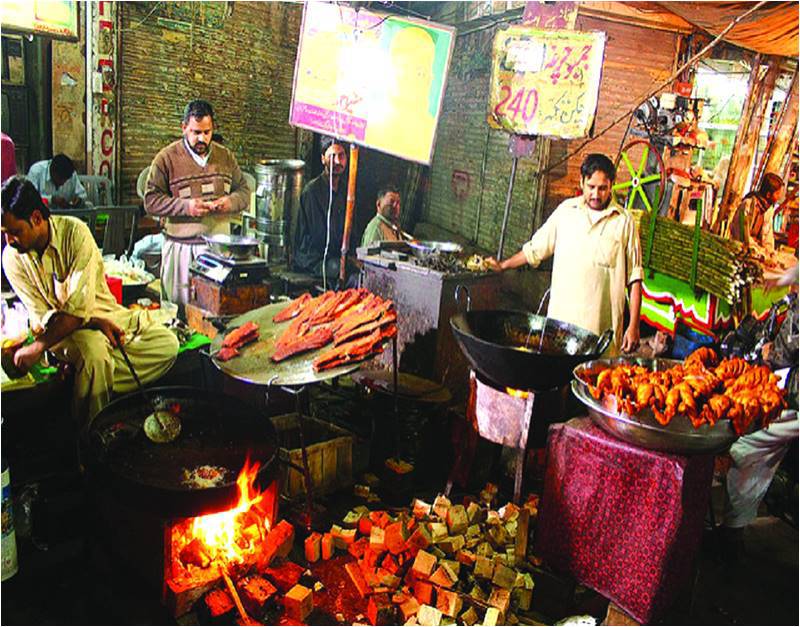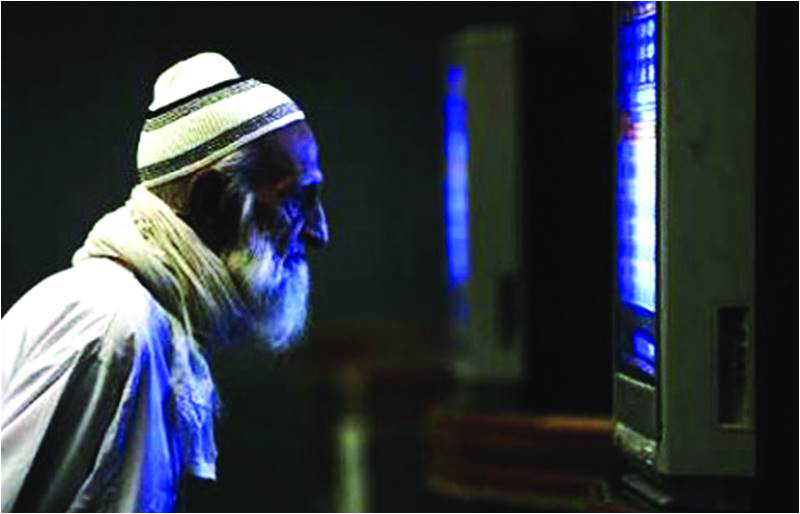
I only just recovered from my joust with an Old City stomach bug, so I was really looking forward to showing off my newly emaciated form in the corners of darkened drawing rooms. Sadly, there was nowhere to go because even in my modest circle of Pakistani acquaintances, three have come down with hepatitis, two have typhoid and one is flirting with a diagnosis between Dengue and Lyme disease. I’ve since resigned myself to a cloistered existence, forced to live off digestive biscuits rather than the external validation of unearned compliments. The calories are not the same, which does not bode well for New Year’s Eve, for which my only plan is to buy the chocolate digestives instead of the regular ones as a mark of commiseration.
“Stomach bugs hurt, too,” I said somewhat defensively after I saw a sick friend in real pain the other day. Most of what I know about visiting sick people comes from repeat viewings of Jane Austen adaptations, which taught me to avoid politics and bring apples in wicker baskets. But Small Talk in Pakistan requires Big Topics. People don’t like to get personal, preferring questions like “What do you make of the situation?” over the vastly more interesting “Birth control: friend or foe?”
Eventually we were joined by friends and family, forming a macabre Victorian tableau around his sick bed. Then they asked me what I thought about the crisis.
I panicked. Smog? Election tampering? Praetorian autocracy? National existentialism? The price of cheese these days?
“You know,” Uncle prodded, “the crisis!”
Climate change? The loss of Kashmir? National debt? Local soap operas pathogens for misogyny?
“Aye hai,” Uncle said after a few tired minutes, “the Army Chief’s extension, bhai.”
“Ah” I lied with practiced ease, “of course”, and then secretly googled recent events as he said words like “unprecedented” and “unbelievable.” I smiled and nodded, raising an eye brow in excitement whenever he got particularly boisterous. From the way he put it, the world as we knew it would ever be the same again. A supreme court has asked an army chief to explain things. The drama! The intrigue! The shift in the status quo!
People everywhere – houses, TVs, papers – spoke as if they were cheering on different sides of a televised-football-game-meets-court-room drama, which, when you think about it, isn’t far from the truth of what was going on. That whole week I got WhatsApp forwards and links to op-eds frothing at the pace of developments: spectators pitting two state institutions against one another in a Godzilla-like battle for supremacy. But it wasn’t, was it? Even as talking heads on TV began dissecting the parliamentary procedure and minutiae of constitutional language, the whole time I kept asking myself one question: Why do you think it matters?
I don’t think I can chalk up my sentiment up to mere cynicism. I really want to know why we assume that the parliament, judiciary and military are equally powerful institutions in this country that has been disproportionately governed by only one of them. That they should be is not an answer to my question. The fact is they are not. Given that we know that, do the theatrical productions like the recent extension hoopla even matter? Isn’t it inevitable that he will get an extension?
When we’re thinking of all this, of course the constitution of the country should matter. But it should also matter that the military has routinely and robustly taken over the machinery of the state with scant regard for that document. It also matters that the military has a decisive influence in shaping foreign policy – in fact many other aspects of policy as well, especially with the current government. These are the realities according to which the county is running.

So when (civilian) people began rooting for the judiciary, I blustered. But then I tried to put my cynicism aside by myself – that in talking about these proceedings, maybe people are essentially looking for hope in our system. Hope that the system itself is more powerful than the actors within it.
And in that sense, there is a marked shift. Yes, the general may have got an extension, but it is also true that it is only for six months and the whole thing has to go thought the mechanisms of parliament. This small change represents a larger shift, particularly since the 2018 elections. That the military leadership can be questioned as functionaries of the state rather than its unquestioned guardians is big. The fact that people are discussing the political role of unelected institutions – be it the military or the judiciary – on TV, print and online is a huge shift.
And while the recent proceedings may not be confirmation of a major overhaul, it is a small but significant shift that may one day lead to an actual shift.
And as my sick friend told me once it was confirmed that he had Malaria and not Lyme disease:
“If you think small things can’t make a difference, try spending a night with a mosquito in your room.”
Write to thekantawala@gmail.com
“Stomach bugs hurt, too,” I said somewhat defensively after I saw a sick friend in real pain the other day. Most of what I know about visiting sick people comes from repeat viewings of Jane Austen adaptations, which taught me to avoid politics and bring apples in wicker baskets. But Small Talk in Pakistan requires Big Topics. People don’t like to get personal, preferring questions like “What do you make of the situation?” over the vastly more interesting “Birth control: friend or foe?”
Eventually we were joined by friends and family, forming a macabre Victorian tableau around his sick bed. Then they asked me what I thought about the crisis.
So when (civilian) people began rooting for the judiciary, I blustered. But then I tried to put my cynicism aside by myself – that in talking about these proceedings, maybe people are essentially looking for hope in our system. Hope that the system itself is more powerful than the actors within it
I panicked. Smog? Election tampering? Praetorian autocracy? National existentialism? The price of cheese these days?
“You know,” Uncle prodded, “the crisis!”
Climate change? The loss of Kashmir? National debt? Local soap operas pathogens for misogyny?
“Aye hai,” Uncle said after a few tired minutes, “the Army Chief’s extension, bhai.”
“Ah” I lied with practiced ease, “of course”, and then secretly googled recent events as he said words like “unprecedented” and “unbelievable.” I smiled and nodded, raising an eye brow in excitement whenever he got particularly boisterous. From the way he put it, the world as we knew it would ever be the same again. A supreme court has asked an army chief to explain things. The drama! The intrigue! The shift in the status quo!
People everywhere – houses, TVs, papers – spoke as if they were cheering on different sides of a televised-football-game-meets-court-room drama, which, when you think about it, isn’t far from the truth of what was going on. That whole week I got WhatsApp forwards and links to op-eds frothing at the pace of developments: spectators pitting two state institutions against one another in a Godzilla-like battle for supremacy. But it wasn’t, was it? Even as talking heads on TV began dissecting the parliamentary procedure and minutiae of constitutional language, the whole time I kept asking myself one question: Why do you think it matters?
I don’t think I can chalk up my sentiment up to mere cynicism. I really want to know why we assume that the parliament, judiciary and military are equally powerful institutions in this country that has been disproportionately governed by only one of them. That they should be is not an answer to my question. The fact is they are not. Given that we know that, do the theatrical productions like the recent extension hoopla even matter? Isn’t it inevitable that he will get an extension?
When we’re thinking of all this, of course the constitution of the country should matter. But it should also matter that the military has routinely and robustly taken over the machinery of the state with scant regard for that document. It also matters that the military has a decisive influence in shaping foreign policy – in fact many other aspects of policy as well, especially with the current government. These are the realities according to which the county is running.

So when (civilian) people began rooting for the judiciary, I blustered. But then I tried to put my cynicism aside by myself – that in talking about these proceedings, maybe people are essentially looking for hope in our system. Hope that the system itself is more powerful than the actors within it.
And in that sense, there is a marked shift. Yes, the general may have got an extension, but it is also true that it is only for six months and the whole thing has to go thought the mechanisms of parliament. This small change represents a larger shift, particularly since the 2018 elections. That the military leadership can be questioned as functionaries of the state rather than its unquestioned guardians is big. The fact that people are discussing the political role of unelected institutions – be it the military or the judiciary – on TV, print and online is a huge shift.
And while the recent proceedings may not be confirmation of a major overhaul, it is a small but significant shift that may one day lead to an actual shift.
And as my sick friend told me once it was confirmed that he had Malaria and not Lyme disease:
“If you think small things can’t make a difference, try spending a night with a mosquito in your room.”
Write to thekantawala@gmail.com

